As Title 42 proceeds through the various courts, the Department of Homeland Security (DHS) announced measures to address potential issues when the policy comes to an end. When Title 42 ends, all noncitizens will again be processed under Title 8. The new border enforcement policies include efforts to improve border security, create safe and orderly processes for those seeking asylum, and limit irregular migration.
- New parole processes are being developed for Cubans, Haitians, and Nicaraguans, based on processes in use for Venezuelans and Ukrainians. Included in the processes is a pathway to citizenship and work authorization. Individuals who do not follow the guidelines will face significant consequences.
- New methods to schedule appointments are being developed using the CBP One app.
- Expedited removal policies under Title 8 are being enhanced and expanded. Plans to provide additional personnel and resources during high-demand periods are included.
- A proposed rule from DHS and the Department of Justice (DOJ) is being created to encourage lawful processes, work with partner countries, and outline the conditions for asylum eligibility for individuals who fail to abide by the law.
DHS is actively monitoring activity at the southwest border of the U.S. and will implement additional measures as required, consistent with all applicable court requirements. Title 42 remains active and as such, individuals who try to enter the U.S. without a legal basis will be expelled.
Country-Specific Processes for Enforcement
Qualifying individuals from Venezuela, Cuba, Haiti, and Nicaragua will have the option to apply to come to the U.S. Using an entirely online process, individuals can apply for advance approval to travel to the U.S. border and be considered for a temporary parole status for up to two years, which includes employment authorization. A thorough background check, including biometrics, biographic national security, public safety screening, and vetting process, must be passed to receive parole. Individuals must have a U.S. citizen willing to provide financial and other support as well. Public health requirements are also required, including complete vaccinations.
Individuals who enter the U.S., Mexico, or Panama, after January 6, 2023, will not be eligible for this program. These processes will allow up to 30,000 qualifying nationals per month from all four of these countries to reside legally in the United States for up to two years and to receive permission to work here, during that period.
Ports of Entry Updates
DHS is making the CBP One mobile app available for noncitizens to schedule port of entry arrival times prior to their arrival. Access to the app is being expanded to Central Mexico to reduce waiting at the U.S. border. Initially, the app can be used to apply for Title 42 exceptions, based on humanitarian needs, and replaces the requirement for individuals to submit requests through third-party organizations near the border.
When Title 42 is no longer in effect, the CBP One mobile app use will expand. Individuals who follow the process and pass all required reviews will generally be given work authorization for the duration of their legal stay.
The CBP One app allows individuals to schedule appointments at the following ports of entry:
• Arizona: Nogales;
• Texas: Brownsville, Hidalgo, Laredo, Eagle Pass, and El Paso (Paso Del Norte); and
• California: Calexico and San Ysidro (Pedestrian West – El Chaparral).
Individuals must verbally attest to their COVID-19 vaccination status and provide proof, as required by Title 19 vaccination requirements.
Increased Use of Expedited Removal
For individuals who are not processed under Title 42, DHS will expand the use of expedited removal as one border enforcement policy. Upon completion of an interview with an Asylum Officer, those who are deemed not to face a credible fear in their home country will be removed. Additional resources will be available in order to timely address demand. Individuals who are removed face a five-year ban on admission and possible criminal prosecution if they try to enter the U.S. again.
Notice of Proposed Rulemaking
A proposed rule from DHS and DOJ aims to establish serious repercussions for those who do not comply with legal requirements for entry, including asylum ineligibility unless they meet required exceptions. A period of public comment will be available upon completion of the proposed rule.
If you have questions about border enforcement policies included in this announcement or any other immigration-related issue, please contact us. We work with our clients to ensure they get the proper guidance.

